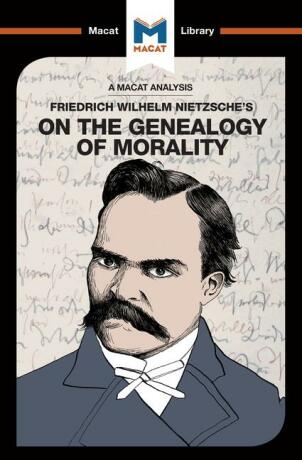4.0 z 5 hvězdiček
měkká vazbaKniha ( měkká vazba )
- Produkt je nedostupný.
Friedrich Nietzsche’s On the Genealogy of Morality is a sustained feat of incisive interpretation. Well known as one of Nietzsche’s greatest works, and as one of the most important books of nineteenth-century philosophy, On the Genealogy of Morality also provided the inspiration for the methodologies of several key philosophers of the modern… Přejít na celý popis
K tomuto produktu zákazníci kupují
-
Burn After Writing

-
VAT Frauds (Carousel Frauds)

-
This is Europe

-
Scattered Minds

-
The Wit and Wisdom of Tyrion Lannister

-
Zen and the Art of Motorcycle Maintenance

-
The Wonderful Wizard of Oz: Accessible Easier Edition

-
The Ring Legends of Tolkien

-
O duševním klidu

-
Breakfast with Her Excellency and Other Notes of a Zoo Director

-
Emoční inteligence

-
Just Kids

-
Po povrchu

-
SAS Survival Guide

-
The Eye Of The World

-
Bestseller Hovory k sobě

-
Atomic Habits

-
Uprdelismus

-
The Shining

-
Mythos

-
The White Album

-
Everyone You Hate is Going to Die

-
Jak si postavit auto

-
Toulavá kamera 36

Friedrich Nietzsche’s On the Genealogy of Morality is a sustained feat of incisive interpretation. Well known as one of Nietzsche’s greatest works, and as one of the most important books of nineteenth-century philosophy, On the Genealogy of Morality also provided the inspiration for the methodologies of several key philosophers of the modern age. Michel Foucault and Judith Butler, among others, cite Nietzsche as an influence specifically because of the interpretative techniques laid out in this work – techniques which are a model for the ways in which interpretation can be used to power critical thinking of the highest order. The key aspects of interpretation are understanding, clarifying, and questioning definitions; what Nietzsche brings to the process is a sense of how important context, history and culture are to understanding any term. In the case of morals, for instance, he argues that if we are to truly understand what we mean by “good” or “evil,” we cannot ever assume the two concepts have a stable meaning, outside of a given moment in history. Indeed, to understand what they mean now, and might mean in the future, we need to trace the genealogy of concepts back to their very roots – a feat of interpretation that Nietzsche undertakes masterfully. Dr Don Berry holds a PhD in philosophy from University College London and an honors degree in mathematics from Cambridge. His research focuses on bioethics. Table of Contents Ways in to the text Who was Friedrich Nietzsche? What does On the Genealogy of Morality say? Why does On the Genealogy of Morality matter? Section 1: Influences Module 1: The Author and the Historical Context Module 2: Academic Context Module 3: The Problem Module 4: The Author's Contribution Section 2: Ideas Module 5: Main Ideas Module 6: Secondary Ideas Module 7: Achievement Module 8: Place in the Author's Work Section 3: Impact Module 9: The First Responses Module 10: The Evolving Debate Module 11: Impact and Influence Today Module 12: Where Next? Glossary of Terms People Mentioned in the Text Works Cited
- Nakladatel
- Macat
- datum vydání
- 1.01.2016
- ean
- 9781912127191
- Vazba
- měkká vazba
- jazyk
- angličtina
- Počet stran
- 98
- isbn
- 978-1-912127-19-1
Hodnocení a recenze čtenářů Nápověda
5.0 z 5 1 hodnocení čtenářů
1× 5 hvězdiček 0× 4 hvězdičky 0× 3 hvězdičky 0× 2 hvězdičky 0× 1 hvezdička
Přidejte své hodnocení knihy
Vývoj ceny Nápověda
Získejte přehled o vývoji ceny za posledních 60 dní.
Články, které stojí za pozornost
-

-

-

-

-

-

-

-

-

-

-

-









 KnihyDobrovsky.cz
KnihyDobrovsky.cz
 knihydobrovsky
knihydobrovsky
 @knihydobrovskycz
@knihydobrovskycz
 @knihydobrovsky
@knihydobrovsky



